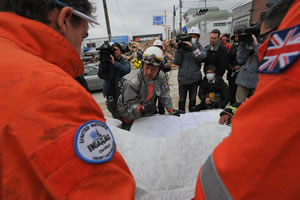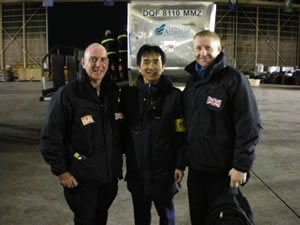A British Search and Rescue Team consisting of 59 rescue specialists, two rescue dogs and four medical staff returned to Manchester Airport on 19 March, having spent three full days searching the towns of Ofunato and Kamaishi in North East Japan following the earthquake and tsunami that struck on Friday, 11 March. The rescue specialists were made up of teams from Lancashire, Lincolnshire, Greater Manchester, West Sussex, Kent, West Midlands, Mid and West Wales, Hertfordshire and Cheshire.
Pete Stevenson, Operational Leader of the entire UK contingent and member of the Greater Manchester Fire and Rescue Service, said that the situation in Ofunato and Kamaishi was "quite bad, they bore the brunt of the tsunami". It was, he recounted, quite eerie: "We'd be going through towns where life was going on almost as normal then we crossed a line, where the wave had finished, and everything was completely destroyed."
|

AFP/JIJI PRESS
Photo: Nicholas Kamm
|
According to Mr Stevenson, the situation in North East Japan could have been much worse if the Japanese people had not been so well prepared. "The Japanese are extremely well organised and have procedures already in place which saved many lives. The people are aware of the risks and have regular drills. They're also aware of the tsunami risk. This undoubtedly lessened the number of casualties. People near the shore were better prepared for the tsunami. They keep abreast of developments and will evacuate but the wave went 1.5 to 2 kilometres inland, which caught many people by surprise. It's like trying to outski an avalanche - you can't do it."
Following the disaster on 11 March, the weather in the area worsened with heavy snowfall and temperatures dropping to -15° at night. When working in such conditions, Mr Stevenson said: "You have to be very safety conscious at all times. You take risks to save lives in this job but you just have to be aware of your surroundings and take extra care."
Of his "remarkable" Japanese colleagues in the search and rescue operation, he said: "We worked alongside people who'd lost everything, fire fighters who had lost family and friends in the quake. They just concentrated on the task in hand. We felt very humbled." The whole team praised the quiet strength and dignity of the people they met: "I have nothing but praise for the Japanese people."
|
Mr Ikuo Shoji, Second Secretary at the Embassy of Japan, was one of the liaison officers who accompanied the rescue team in the affected area. He said: ��I appreciate the industrious and sincere attitude of the team. Despite difficult conditions including aftershocks and heavy snowfall, they stuck to their task. I pay my deepest respect to them.��
On their return to Manchester airport on 19 March, the team were greeted by Mr Hitoshi Noda, Minister Plenipotentiary at the Embassy of Japan, who was there to convey his deepest gratitude for all of their efforts.
Mr Stevenson ended by remarking upon how much the team appreciated its services being requested by the Japanese Government. "We've worked with the Japanese before and we were pleased to be so highly thought of. We also felt very emotional that Minister Noda had taken the time to meet us at Manchester Airport."
|

Mr Ikuo Shoji (centre) with Pete Stevenson (L) and Roy Wilsher |

